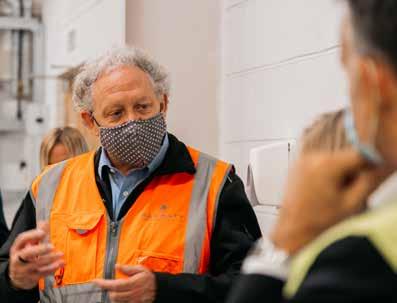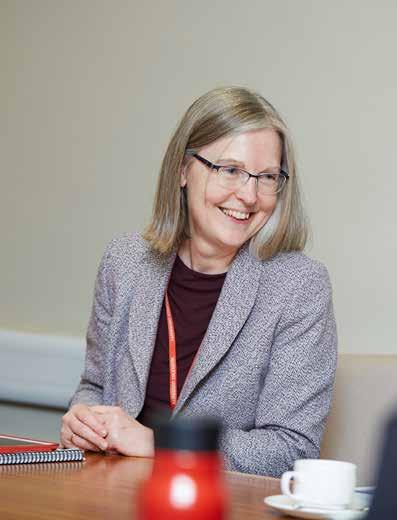
10 minute read
BUILT TO LAST
SPOTLIGHT ON ROB TANSEY AND BARRATT DEVELOPMENTS
Constructive progress in UK social mobility
ROB TANSEY, GROUP HR DIRECTOR AT BARRATT DEVELOPMENTS, TALKS TO JUSTINE GREENING ABOUT THE COMPANY’S WORK TO FILL A SECTOR-WIDE SKILLS GAP BY FINDING UNTAPPED TALENT.
Q// What does social mobility mean to Barratt as a business and why it is so important?
A// Our company vision puts the customer at the heart of everything that we do. In many respects it starts here. If you treat your customer right you will create a positive employer brand perception that will [also] mean people will want to work for you. And those people [already] working with you, will want to stay with you. One of the key opportunities for us is actually opening up many different pathways for people to come and work for us. We’ve had a diversity and inclusion strategy for a number of years but we’ve still got an awful lot to do. As part of our business strategy, we know that we have a skills crisis and we know that we need to look at other routes to market and other pools of employment. So it is not purely altruistic. By reaching out to those in socially deprived areas, we have an opportunity to improve our business and improve lives. Q// Tell me about some of the ways you’ve broadened the range of talent coming into the organisation.
A// Three years ago we embarked on a programme whereby we accepted that around less than 40 per cent of our workforce was female. In senior management it was around 15 per cent. Our BAME statistics were not good [either]. As a consequence, we had a programme of inclusive leadership and unconscious bias training, which everyone in the organisation has been through. They are all now in a position where they are looking at their recruitment methodology, how they treat their people and how they promote them; and they are doing it in a much more inclusive way. But we’ve got a long way to go. We have a number of graduates that work for us, who created something which I was really proud of called Built By Both. It’s a series of networking events in construction for like-minded people in all different types construction. We have lots of speakers come
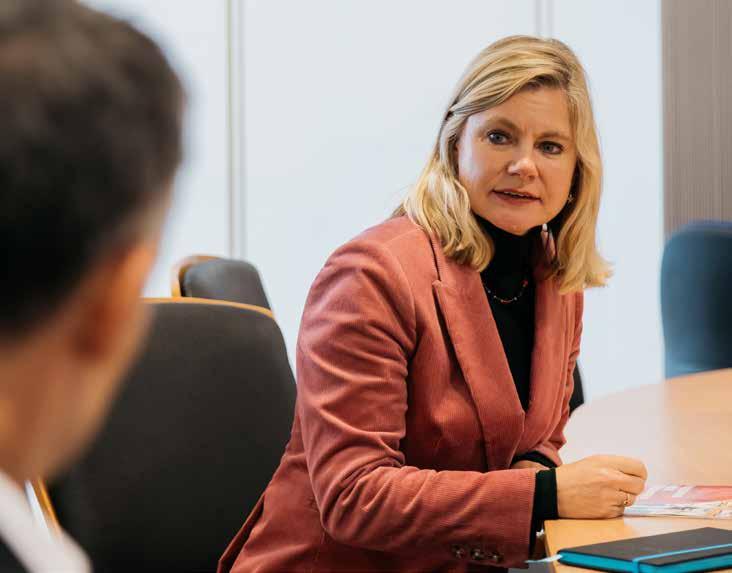
along and really motivate people. The sole driver is to say that construction and women can go hand-in-hand and there are some phenomenal career opportunities for people within construction and housebuilding. But we wanted to showcase that and our grads ran numerous events in London, and in Manchester, and they were exceptionally successful. This is still alive and kicking currently.
Q// I guess a lot of this approach involves confronting stereotypes through the role models you have within the business?
A// We have a lot of women in hands-on, site management roles [who would] come and talk to people at our events and I thought that worked exceptionally well. We have also looked at other routes. For us the ex-armed forces represented a marvellous opportunity. We teamed up with the Career Transition Partnership and saw an opportunity to recruit ex-armed forces people that have come from varying backgrounds who are looking to get into civvy street. They’ve got some phenomenal skills and abilities and great training behind them - probably the best training in the world. We have something like 400 sites and have historically recruited site managers from other housebuilding sites but we decided to look at it very differently. We’ve now got more than a hundred ex-armed forces people working with us who have become immersed in housebuilding and very quickly are managing or assistant managing our sites as we speak. So it’s about diversity of thinking in terms of different talent pools, but also those individuals will come from different backgrounds in some cases, from social deprivation, and they’ve got an opportunity that perhaps they would never have had before.
Q// You’re also working with ex-offenders and the homeless - how do you approach taking on board such a diversity of people all at the same time?
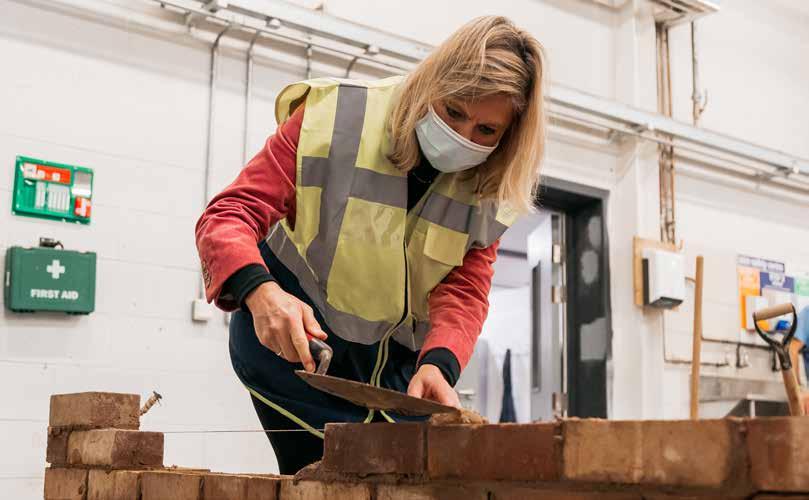
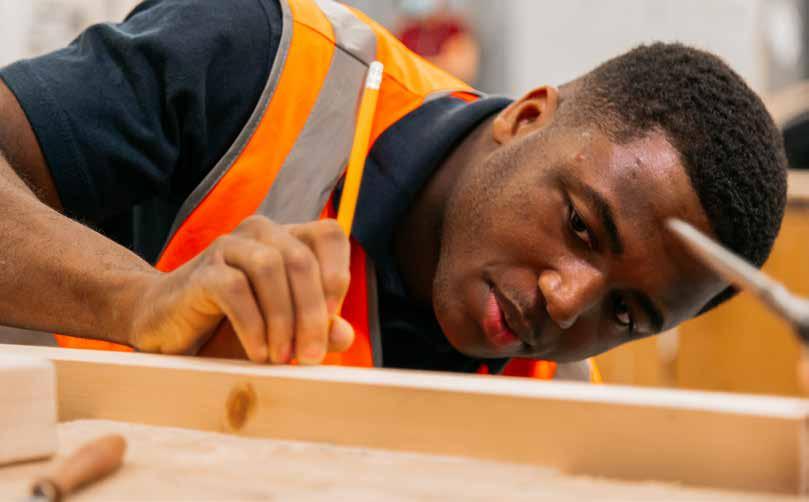
A// We’ve come across some phenomenal young people that we would seriously consider bringing into the organisation in the many pathways that we have. It’s not always easy, [but] we have tried to engage with a number of organisations on ex-offenders. Recycling Lives is a wonderful charity in the North West whereby they have a business that actually provides services to organisations who need recycling support. In a number of prisons in the North West they actually have workshops where people are doing work for the business - preparing them and transitioning them to get into work in the real world. We work with them, as well as Bounce Back in Brixton prison, and we also have worked with a number of prisons on the Isle of Wight. Our intention has been to engage with them to see if there are individuals that could then transition into working with us. We’ve had some success. We’ve also got a lot of outreach programmes. One of our most exciting is the Beacon of Light, in Sunderland [a sports, community and education facility]. We know in that part of the country there are a lot of young people not in education or employment and from socially deprived areas. We are focusing on young people aged 14 to 19+ and, through a number of programmes, we are trying to engage young people in construction, in terms of either the workplace or further education. Our ambition this year is to help more than 800 of those individuals through those programmes. In some cases we have been able to bring them into our organisation and provide them with work placements or jobs. We [also] work with Whizz-Kidz, a wonderful charity for young people with disabilities. They are helping us on this journey [to be more inclusive]. We’ve audited all our offices from the perspective of a disabled individual and asked would this work environment work for them. We did our own research and with third parties worked to get offices ready. We then invited Whizz-Kidz to visit our sites and actually [experience] them. They gave us additional advice and guidance and we made those final adaptations. [It’s about] proactively ensuring that we are attracting those individuals to the business and I think it’s a work in progress. In terms of BAME representation, when we started our journey on diversity and inclusion we focused on gender. It was the first characteristic that we felt we could get our arms around. We are now in the process of getting our arms around this [BAME] challenge and within the business we have a number of groups including a BAME networking group which is a cross-functional group of people who meet remotely through facilitated discussion. We talk to them about their perceptions of working with us and what could be better - and what needs to be better from a BAME perspective. Again this is a work in progress but this is something that we really want to drive to ensure that we are attractive to people from a BAME background - and also that people within the business from this background feel engaged and motivated.

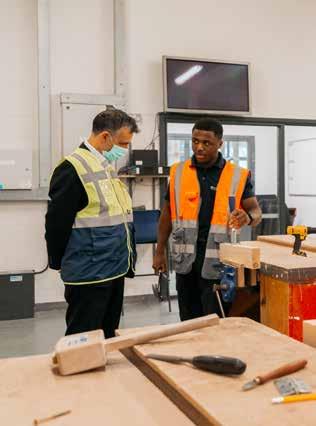
Constructive progress in UK social mobility
HOW NATIONAL HOUSEBUILDER BARRATT DEVELOPMENTS IS HELPING TO CLOSE BRITAIN’S OPPORTUNITY GAP
Barratt’s philosophy of leaving a positive legacy in the communities around its developments has been clearly demonstrated by its strategic approach in making a social impact across society. It demonstrated a unique and impressive commitment to this as it set out to prepare diversity action plans for its division and subdivisions throughout the company, with the aim of identifying where barriers to diversity existed, and to set out to improve against the new targets set out. Through developing these plans Barratt has demonstrated a strategic and considered approach to boosting diversity both nationally and locally. Barratt has demonstrated a highly successful track record in generating positive outcomes in local communities, across its engagement with schools, and through initiatives such as the Barratt Homes Construction Academy, in partnership with Sunderland AFC’s Foundation and the Beacon of Light. The Beacon of Light has engaged over 300,000 young people in the North East of England, the region with the highest number of young people not in employment, education, or training, and Barratt’s Construction Academy supports 400 learners through its specific programmes every single year. Barratt has been identifying and supporting vulnerable groups in communities across the UK, specifically supporting the homeless or those at risk of homelessness into employment in partnership with St Mungo’s charity; and through supporting organisations such as Recycling Lives, Barratt has been helping rehabilitate ex-offenders and help them back into the world of work and meaningful employment, including within Barratt itself. Throughout this specific work in helping vulnerable groups, Barratt has proven its will to not just look for the easy wins across the responsible business agenda, but take on some of the widest opportunity gaps and the most significant challenges. Barratt has set out to increase the diversity of pathways into housebuilding and the wider construction sector, and specifically address the poor record of the sector in drawing and retaining female talent into roles, with only 13.32 per cent of the sector being female according to the most recent data produced up to June 2020. Barratt has empowered its graduates to lead on these solutions, as they created a legacy project, ‘Built by Both,’ which aims to champion the involvement of females and males in the sector, and create a network for women with ambitions to enter the sector. It is also creating opportunities for young people to earn qualifications such as degrees without the fees through its degree apprenticeship programme. This currently has 86 apprentices on the programme and caters for apprentices of all ages, many of which are school leavers, but also includes members of Barratt’s workforce who might be midcareer but wish to study towards a degree or higher qualification. Furthermore, Barratt has looked to address where business needs overlap with societal issues which it can have a positive impact on. One of these is its ability to target opportunities, in training and work, towards groups which might constitute untapped talent pools, and traditionally face more significant barriers into entering skilled work. This also fits a business need with an increasing deficit of a skilled workforce in house building and construction sectors in the UK.
Barratt has an innovative and transparent “ approach to boosting diversity through the use of data.
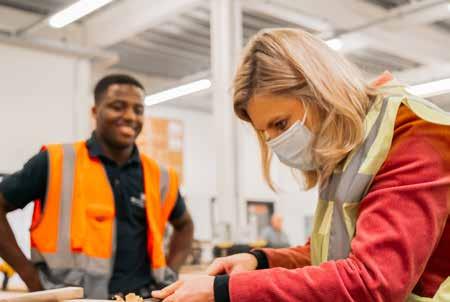
Barratt is tapping into untapped talent pools namely through its Armed Forces Transition Programme, as it seeks to make the progression into civilian life easier for former servicemen, by helping train, mentor and support them into careers in the sector. The company has also demonstrated a strong ethos of innovation as it consistently reviews its progress and performance on boosting diversity and testing how fit for purpose its current ways of working are. As such, Barratt’s new data-led approach is utilising an Applicant Tracking System to benchmark diversity performance across both recruitment and progression within the company. This is currently used to blank out diversity characteristics to reduce any potential discrimination in the recruitment process. Barratt has piloted name-blind recruitment in one division of the company, which will be rolled out over coming months. Barratt is also considering tracking further socioeconomic diversity statistics, such as free school meals, and wider sophisticated factors too. Barratt has also recently launched an innovative and transparent approach to boosting diversity through use of data. The new and industry-leading Applicant Tracking System has equipped Barratt with the means to provide transparency of reporting through tracking the data of its applicants and employees, and thus help focus Barratt’s decisions and activity, and therefore drive action. This use of data has also strengthened Barratt’s ability on succession planning, which in the context of a skills shortage in the sector and across the country, is crucially important to deliver the future skills to build the highest quality homes, and put customers and communities first. In summary, Barratt Developments has shown how putting diversity and widening opportunities can be more than just a responsible business agenda, but actually at the heart of a central business agenda. It has integrated and interwoven its ambitions on diversity into how it operates as a business everyday, leaving a positive legacy in the communities around the sites it builds, and making progress towards building a more diverse house building and construction sector.
